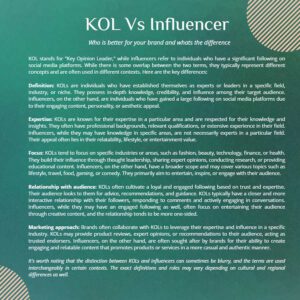KOL stands for “Key Opinion Leader,” while influencers refer to individuals who have a significant following on social media platforms. While there is some overlap between the two terms, they typically represent different concepts and are often used in different contexts. Here are the key differences:
Definition: KOLs are individuals who have established themselves as experts or leaders in a specific field, industry, or niche. They possess in-depth knowledge, credibility, and influence among their target audience. Influencers, on the other hand, are individuals who have gained a large following on social media platforms due to their engaging content, personality, or aesthetic appeal.
Expertise: KOLs are known for their expertise in a particular area and are respected for their knowledge and insights. They often have professional backgrounds, relevant qualifications, or extensive experience in their field. Influencers, while they may have knowledge in specific areas, are not necessarily experts in a particular field. Their appeal often lies in their relatability, lifestyle, or entertainment value.
Focus: KOLs tend to focus on specific industries or areas, such as fashion, beauty, technology, finance, or health. They build their influence through thought leadership, sharing expert opinions, conducting research, or providing educational content. Influencers, on the other hand, have a broader scope and may cover various topics such as lifestyle, travel, food, gaming, or comedy. They primarily aim to entertain, inspire, or engage with their audience.
Relationship with audience: KOLs often cultivate a loyal and engaged following based on trust and expertise. Their audience looks to them for advice, recommendations, and guidance. KOLs typically have a closer and more interactive relationship with their followers, responding to comments and actively engaging in conversations. Influencers, while they may have an engaged following as well, often focus on entertaining their audience through creative content, and the relationship tends to be more one-sided.
Marketing approach: Brands often collaborate with KOLs to leverage their expertise and influence in a specific industry. KOLs may provide product reviews, expert opinions, or recommendations to their audience, acting as trusted endorsers. Influencers, on the other hand, are often sought after by brands for their ability to create engaging and relatable content that promotes products or services in a more casual and authentic manner.
It’s worth noting that the distinction between KOLs and influencers can sometimes be blurry, and the terms are used interchangeably in certain contexts. The exact definitions and roles may vary depending on cultural and regional differences as well.
